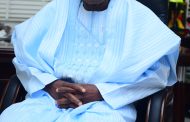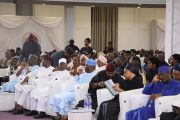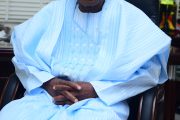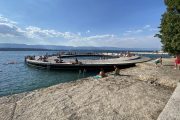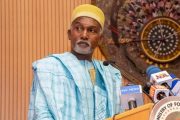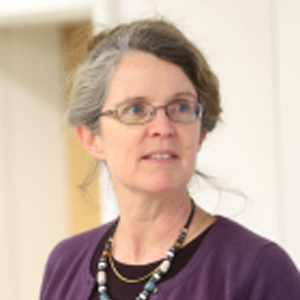
Prof Kate Meagher
It was a huge communal pat on the back for Prof Kate Meagher, the wife of departed Nigerian Professor of African Politics at Oxford University in the UK who died August 8th, 2017. Speaker after speaker at the well attended Memorial Lecture at the Yar’Adua Centre, Abuja Saturday, (August 26th, 2017) centered on Prof Meagher, originally a Canadian who teaches International Studies at the London School of Economics and Political Science, London and the mother of their two children.
Professor Ibrahim Gambari who delivered the lecture did not start the heavy reference to Meagher but he gave weight to the referencing by disclosing how he was the Father of the Day at their wedding in Canada on August 11th, 1990. “It is all like yesterday”, said Gambari who went on to describe Meagher as a remarkable, dedicated wife, adding “she is a true Nigerian wife”. This was before the scholar-diplomat went into the hub of his lecture, the substance of which is sure to keep the Nigerian foreign policy establishment and the scholarly community reflectively busy for some time to come. Prof Gambari raised questions about the tensions between democracy and development as well as what could be described as the crisis of foreign policy in Nigeria, providing five key suggestions that might be subjects of deconstruction here and there when the full text is available.
Alhaji Sani Iro who might have inaugurated the tributes to Meagher disclosed how she settled in Rogo community in Kano where Raufu had been researching the Nigerian agrarian space. According to the community leader, Meagher arrived with a note from her late husband and subsequently fitted very well into the community for a whole year. The people of Rogo will never forget the couple, he told the audience. Explaining himself, he spoke of a Rogo Farmers Trust Raufu put in place to cement his relations with the community that provided a research population for his agrarian studies, a Trust which facilitated fertiliser and other aid to farming for members of the community in addition to assistance in securing admission for applicants from there.
Hajia Asmau Joda followed suit in an emotion laden tribute to the late Prof Raufu whom she described as ‘a little more than a friend’, a real Nigerian and the wife for being a strong family factor throughout. It was Mallam AB Mahmoud, long time friend of the Raufus who provided ultimate framing of Meagher by describing her as “being more Nigerian than many of us”. Concluding his vote of thanks, the President of the Nigerian Bar Association, (NBA) said “she is such a wonderful woman. What can we say! Thank you Kate”.
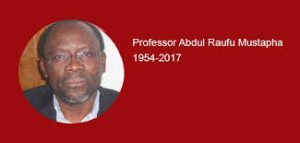 Although Prof Meagher was the main issue, speakers equally stressed Raufu Mustapha as a case study in excellence, most signposted by still being able to graduate as the best student in Political Science in 1979 in spite of considerable time he spent providing leadership for the radical front – the Movement for Progressive Nigeria – in Ahmadu Bello University student politics. Raufu as an embodiment of Nigeria’s diversity was equally stressed: being born and growing up at Aba in the east up to a point before moving to Kano and later schooling at the Federal Government College, Sokoto, followed by return ‘home’ to Ilorin to do his ‘A’ Level papers and then to Ahmadu Bello University, Zaria for his undergraduate programme. As such, he combined so many identities, making him absolutely Nigerian.”Raufu was fluent in Igbo, Hausa and Yoruba languages and felt at home in all parts of the country” was how Prof Jibrin Ibrahim put it.
Although Prof Meagher was the main issue, speakers equally stressed Raufu Mustapha as a case study in excellence, most signposted by still being able to graduate as the best student in Political Science in 1979 in spite of considerable time he spent providing leadership for the radical front – the Movement for Progressive Nigeria – in Ahmadu Bello University student politics. Raufu as an embodiment of Nigeria’s diversity was equally stressed: being born and growing up at Aba in the east up to a point before moving to Kano and later schooling at the Federal Government College, Sokoto, followed by return ‘home’ to Ilorin to do his ‘A’ Level papers and then to Ahmadu Bello University, Zaria for his undergraduate programme. As such, he combined so many identities, making him absolutely Nigerian.”Raufu was fluent in Igbo, Hausa and Yoruba languages and felt at home in all parts of the country” was how Prof Jibrin Ibrahim put it.
Dr Ukoha Ukiwo referred to Raufu as unassuming and humble, so objective and balanced in his review of evidence. Dr Yahya Hashim, one of Raufu’s closest friends sent in a long narrative of their friendship which started from the Federal Government College, Sokoto where they inaugurated what they later came to understand as anti-imperialism by saying no to racial discrimination and exclusion.
In an intervention that may be described as the kernel of the life and times of Raufu, Comrade Ayuba Waba, the President of the Nigeria Labour Congress, (NLC) said if the children of the poor were given the type of education that produced the Raufu Mustaphas of today, that would have been the way to resolve inequality in the society. But he asked whether the children of the poor could access that sort of education today. For him, Nigeria had an educational system that was adequate. Today, it has evaporated and there are no signs of attempts to restore that old order.
A spokesperson for the Ilorin Emirate Descendant Union spoke of how Raufu never forgot his roots in spite of having travelled far and wide in the world. Mrs Kemi Okenyodo for whose Partners West Africa Raufu offered advice credited Raufu with having led an impactful life while the Marafan Kano who represented the Emir, Muhammadu Sanusi 11 described Raufu as an intellectual power house. Dr Adam Higazi, a Research Fellow at Modibbo Adama University in Yola who was a student of Prof Raufu spoke of his democratic spirit to the point of engaging even with authors he (Raufu) disagreed with. “He is an example we should all strive to follow”, said Higazi. Zovera Youssoufou, the Chief Executive Officer of the Dangote Foundation expressed Aliko Dangote’s regret for being absent at the occasion and took time to speak to Raufu’s efforts to get the foremost African businessman to fund a Chair at Oxford University in what might have been the most sensational intervention in the global politics of knowledge production. Prof Mohammed Kuna delivered a tribute from the Council for the Development of Social Science Research in Africa, (CODESRIA) in the same manner that Dr Kole Shettima of MacArthur Foundation delivered the message from Oxford Uiversity.

Dr Haroun Adamu
The occasion chaired by Dr Haroun Adamu, PRP stalwart in the Second Republic had many civil society activists, academics especially from the Academic Staff Union of Universities, (ASUU), media, policy elite and politicians in attendance. Curiously, the ASUU leaders were not called to address the audience even though it is on record that Prof Raufu put together a programme at Oxford in 2015 which involved many of the ASUU leaders. Secondly, although someone spoke from the Department of Political Science of Ahmadu Bello University, Zaria, it was none of those who knew the ‘real’ Raufu except if one took Jibrin Ibrahim’s comments but Ibrahim has had nothing to do formally with ABU, Zaria for a long time now.
Faces in the as far as people who knew the late Raufu Mustapha, especially at Oxford, would include Prof Attahiru Jega, immediate past Chairman of Independent National Electoral Commission, (INEC); Dr Kayode Fayemi, Nigeria’s Minister for Solid Minerals; Prof Okello Oculi of Africa Vision 525; Dr. Usman Bugaje; Prof Dipo Fashina, the elder activist; Dr Abdullahi Sule-Kano of the Department of Political Science, Bayero University, Kano; Mallam Yakubu Aliyu, an Abuja based development consultant; Mallam Illyasu Gadu who though did not school at Oxford was part of the Nigerian/African student squad who, along with the late Tajudeen Abdulraheem, generated so much intellectual and activist heat on the London-Oxford axis in the late 1980s and 1990s.
Life With Raufu Mustapha – Wife
Speaking at the occasion, Prof Meagher who cautioned against being addressed as Professor yet gave elaborate insight into life with Raufu Mustapha, describing him as her teacher by saying “I learnt so much from him throughout”. Switching to Raufu’s patriotism, Meagher said Raufu’s love for Nigeria was such that he told her there could be no marriage unless she followed him to Nigeria, which she did, having to negotiate roadblocks without paying. Although critical of Nigeria in terms of performance, the late Raufu prized Nigeria, she said, calling attention to how conscious he was of the country’s potential. Raufu, to her, was a reluctant migrant who missed Nigerian food dearly. She said Raufu couldn’t wait to retire and return to Nigeria.
Meagher equally spoke about Raufu’s combination of identities: a proud son of Ilorin, element of Yoruba identity and a nationalist. “We are proud to share Raufu’s life”, she declared, expressing the hope that his works would continue to be useful and concluding her intervention with an Irish and the Hausa expression “Allah ya Jikansa”, (God bless his soul).
Jibrin Ibrahim might have provided an epitaph by summing up Prof Raufu in terms of agency, action and change. That might be the epitaph for a man who is still unfolding in the diversity of identities, interests and forces he aggregated in his life time. By the testimonies which has been flowing since his death and might have climaxed today, Raufu provided a completely different pathway on the politics of identity in his ability to manage his own multiplicity of identities without the clashes attendant on identity. He straddled the ruling and the working class divide, the ethno-religious fault lines, the linguistic barriers and even the radical-conservative divide, combining the peasants in Rogo, for example, with the Dangotes, Emir of Kano, etc on the other hand.
He must have been able to do this by freeing himself of the confusion that post structuralist thinkers and orthodox Marxists have fallen regarding the class-ethnicity nexus or the management of difference generally by clinging to emancipation politics which does not see the insistence on balancing the power of the weak against that of the strong as inherently something that must be done along the line of any of the orthodoxies. Dr Yusuf Bangura pointed this out clearly in his tribute published earlier on in this medium and other places. In other words, his works might acquire larger consultation at his death than when he was alive. That’s the way of academics, or is it intellectuals?




